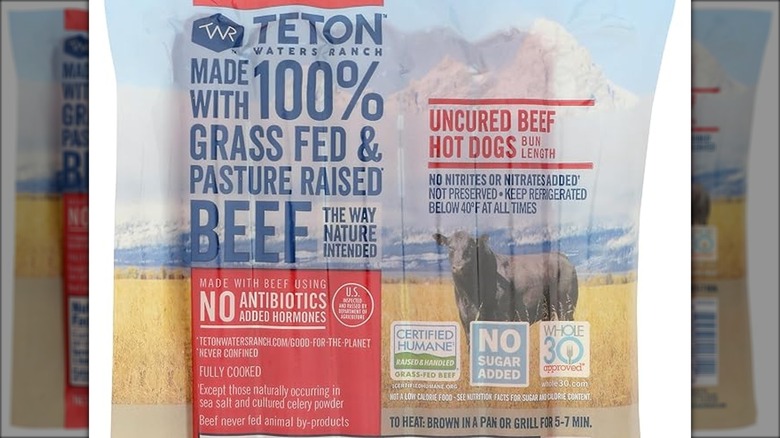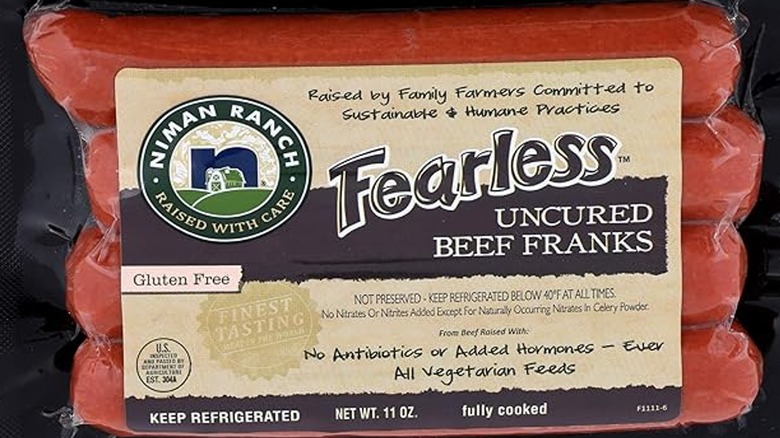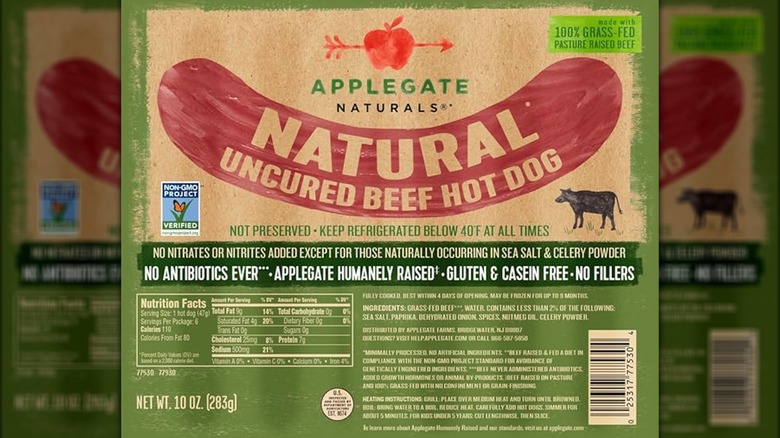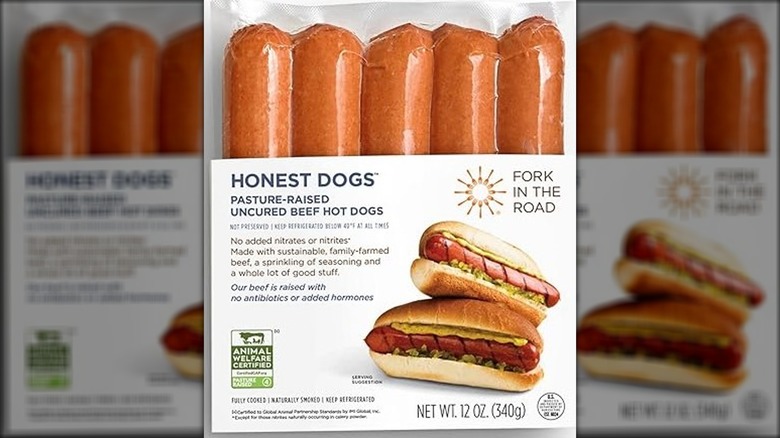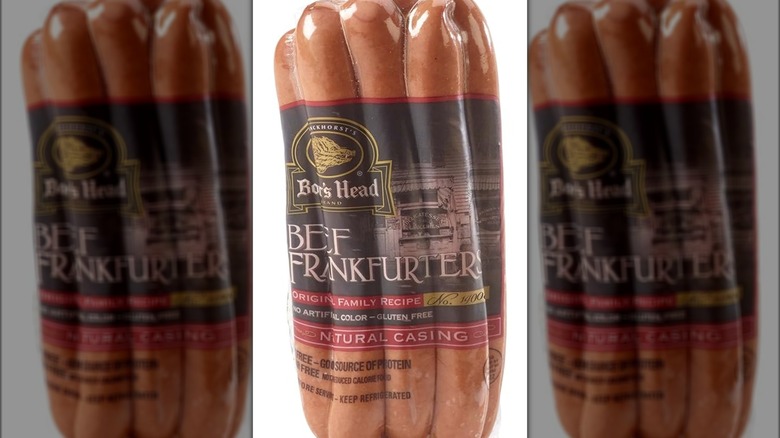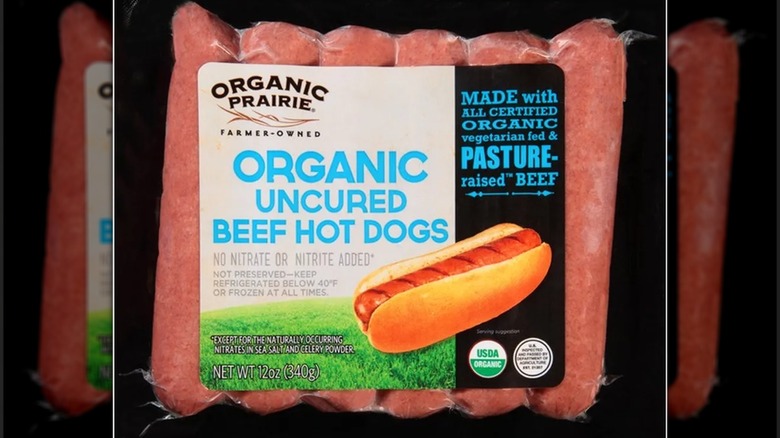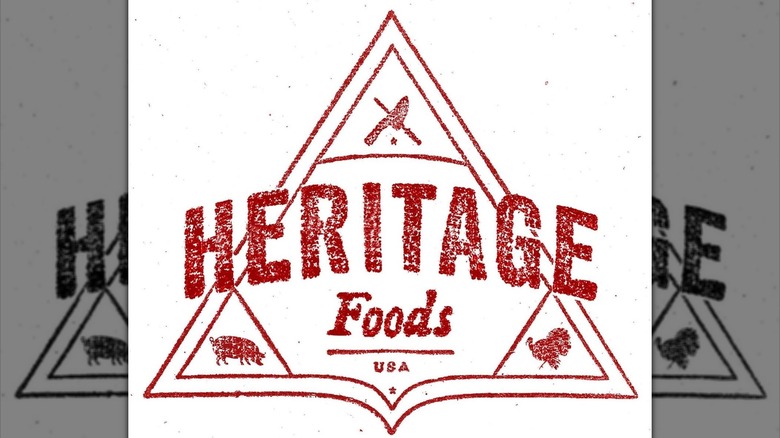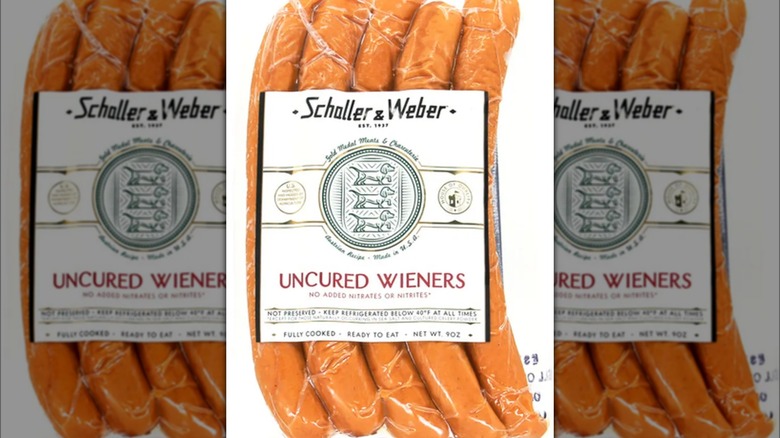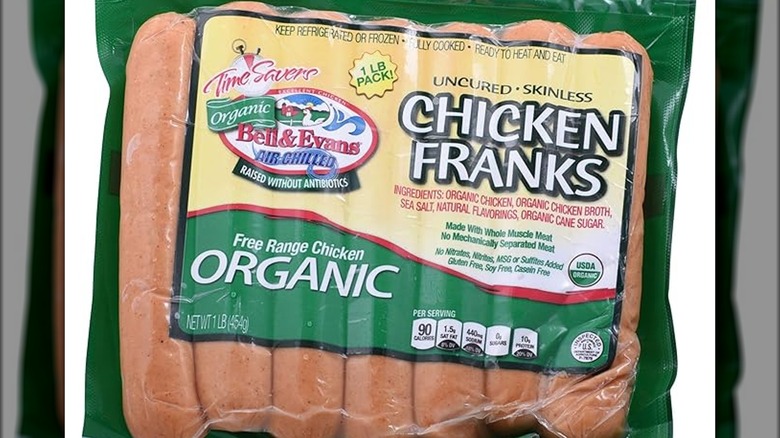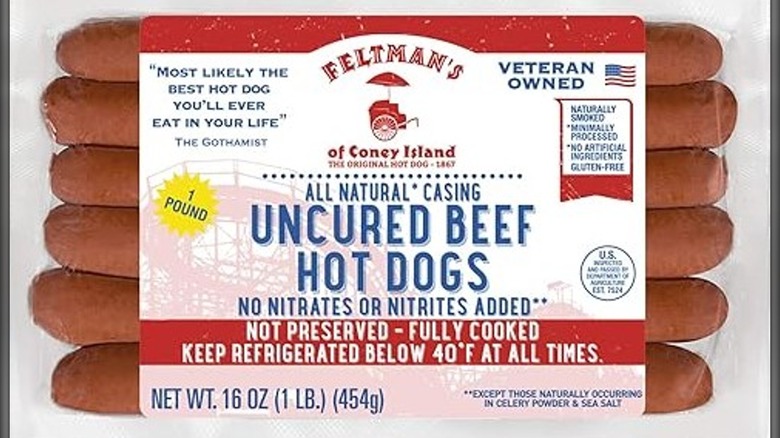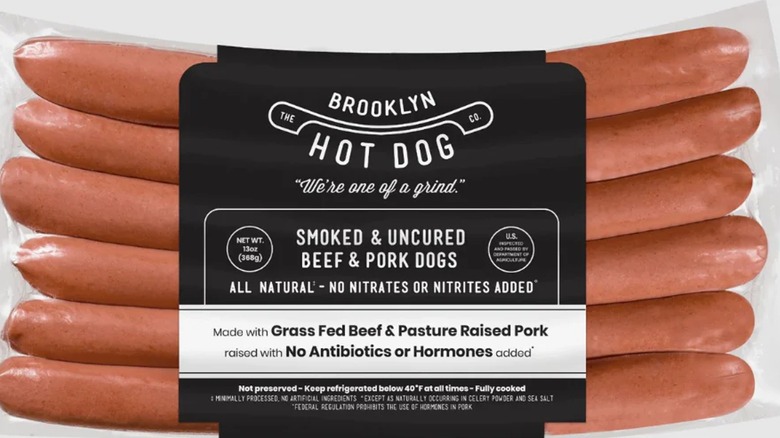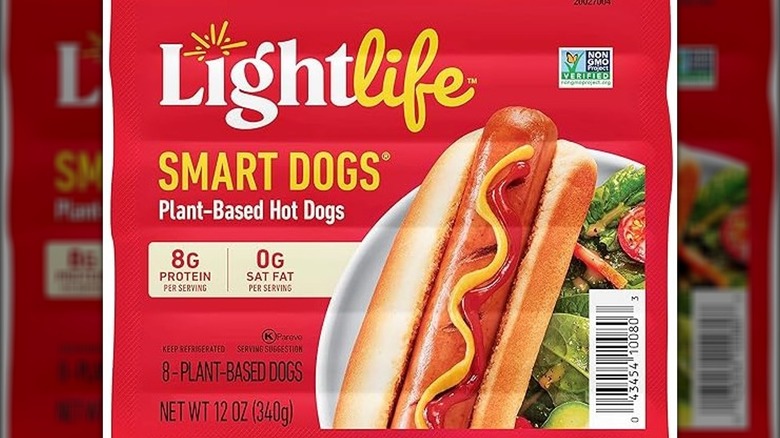These 12 Hot Dogs Use Only The Best, High-Quality Ingredients
We may receive a commission on purchases made from links.
Few foods conjure up thoughts of backyard BBQs and summertime fun in the same way that hot dogs do, and it's no secret that they're pretty universally loved. What else is universally loved? The other kind of dogs, our faithful canine companions that make life oh-so-much-better. Here's some food for thought: Most hot dogs are so full of salt, additives, and other questionable ingredients that the American Kennel Club actually recommends that you don't feed your canine BFF hot dogs. They say that even one might cause some serious gastrointestinal problems for poor pupper, and add that you definitely shouldn't give in to those puppy dog eyes.
If hot dogs aren't great for pupper, what does that mean for you and your human family? It's no secret that hot dogs have a reputation as a bit of a mystery meat, and that there can be all kinds of things hidden in those meat tubes. But don't worry, there's good news here, too.
The enduring popularity of hot dogs means that more and more companies are adding their own versions of these delicious dogs to grocery store shelves — and that means there are some really good options out there. Interested in which hot dogs you can safely buy and feed your family, without having to feel guilty about it? Let's talk. (And while you're here, don't forget to check out our take on the best and worst ways to cook hot dogs.)
Teton Waters Ranch
Check out the reviews Amazon customers have posted about Teton Waters Ranch hot dogs, and they're pretty much in agreement: Not only are they free of any weird ingredients, but they're tasty, too. The biggest beef (and yes, we went there) is that they're a little on the small side, and can be pricey. But for what you get, it's expected that you're going to have to pay a little extra. Teton Waters Ranch not only boasts products that are made with grass-fed cattle but also from farmers and ranchers that have been awarded Certified Humane designations. Animals are raised in pastures instead of feedlots, without antibiotics or hormones. One of the things that we really like about the company is the complete transparency presented from start to finish.
Teton Waters Ranch also has a focus on sustainability, which is another win that goes a long way in guaranteeing these hot dogs are going to be around — and remain high-quality — for a long time. Now, what about the actual ingredients?
They're pretty straightforward, and in addition to the beef, there's flavorings that include things like paprika, garlic, celery powder, cherry powder, and onion. Add in some salt and vinegar, and that's literally it. It's the same ingredients list that's on their cocktail franks and bun-length dogs, so whichever way you go, you're getting a quality product.
Niman Ranch
Niman Ranch has a line of different hot dogs, including the delicious-sounding Grass-Fed Angus Beef Franks and Jumbo Beef Fearless Franks. It's the latter that had one Amazon reviewer raving, "... they just taste like actual meat instead of salt-flavored meat product. If you're looking for that nice, nostalgic trash food flavor, these aren't it." Other customers agreed, awarding these high marks all around.
The ingredients listed on these dogs are pretty straightforward, too, with beef, spices, and — strangely — nonfat dry milk. There are a few others on here, too, including dextrose and sodium phosphate, but both of those are widely used, standard ingredients that help with stability, shelf life, and sweetening.
Niman Ranch's transparency is also admirable, posting their full protocols for sourcing beef, pork, and lamb online. In addition to giving priority to family-owned farms, they also have extensive protocols in place for quality feed, access to pastures and shelters, and extensive guidelines for rating animals used in breeding programs. There are no antibiotics, no hormones, and all source farms are Certified Humane, which ends up reflected in the taste of the meat.
Applegate
Applegate advertises a mission of "Changing the Meat We Eat," and that means a few things. First and foremost, it means overhauling the way antibiotics are used in livestock, which has — for a long time — threatened to lead to massive problems involving antibiotic resistance. In addition, the company promises clean products free of artificial or genetically modified ingredients. As for animal welfare? That's important, too: The company was founded by a vegetarian who wanted to make a meat product without the cruelty that the industry is all too widely known for.
That's the case with the beef hot dogs, the chicken, and the turkey, which all include ingredients like salt, vinegar, onion, celery, and a slew of spices, like cayenne, ginger, and coriander. Pretty straightforward, right? That's what we like to see.
In addition, Applegate also has strict regulations about how long young animals are kept with their mothers, and that they're provided with environmental enrichment. Animals treated by a veterinarian for illness also aren't used in any products.
Fork in the Road
With a product name that has "honest" in it, it's sort of understood this is going to go one of two ways: either it's legit and meaningful, or very tongue-in-cheek, wink-wink. In the case of Fork in the Road, it's the former. These "Honest Dogs" have a very straightforward ingredient list that specifies pasture-raised beef, and with just a handful of other items — including vinegar, salt, garlic, onion, mustard, and spices — you know exactly what you're getting when you put a package of these on the grill.
Like many of the other companies that made our list for high-quality hot dog ingredients, Fork in the Road stresses that the humane, compassionate care of the animals that eventually make it into their hot dogs is a high priority. (The company's dedication to sourcing products from family farms is also something we can wholeheartedly get behind, because without farmers, where would the world be?)
Is it reflected in the taste? Absolutely. Take a look at some of the feedback on Amazon, and it's clear that even though these dogs might be a little higher in price, many people find it's worth it for quality ingredients. One reviewer even said, "I will never have to search for another hot dog brand again because I have found my Holy Grail beef franks!" It doesn't get much better than that.
Boar's Head
Boar's Head has a reputation for quality meats, so it's not entirely surprising it made our list of high-quality hot dogs. These uncured beef frankfurters can be purchased with or without natural casing, and either way, they're free of things like added sugar, MSG, nitrates, and nitrites. The ingredient list is very short, with only beef, water, celery powder, paprika, salt, and natural flavors. Then, there's the with-or-without of a sheep casing. That's it!
While many of the companies putting out high-quality hot dogs are relatively new to the market, Boar's Head has been around for a long time. At more than a century old, the company has always stressed high-quality ingredients ... even during that long, dark time in the 1960s when hot dogs were used in everything from casseroles to gelatin.
First and foremost in that commitment is animal welfare and the so-called "five freedoms," which are the widely accepted guidelines for raising livestock responsibly. Boar's Head operates on the premise that "quality products come from quality ingredients," and when animals are raised humanely, provided for, and treated well, that's reflected in the end product.
Organic Prairie
Organic Prairie's Organic Uncured Beef Hot Dogs get all kinds of high marks. On a scale of one to 10 (with one being the best), these tasty dogs are rated 3.5 on the Environmental Working Group's scorecard. Major points are given for responsible practices, including forbidding the use of synthetic chemicals, antibiotics, hormones, and growth promoters that are of such high concern with many processed foods. And there's nothing on the ingredient list to worry about; just organic, grass-fed beef, sea salt, spices, onion, garlic, and celery.
Organic Prairie also promises that when it comes to the timeline of production to plate, the hot dogs were frozen immediately after production, with just three weeks' time until the sell-by date. That's a big deal for anyone who's trying to keep shopping trips to a minimum and food stocked in the freezer for a rainy day.
They also note that the diet their cattle are fed on, pasture grass, means a more nutritious end product — in addition to happier cattle, which we can all get on board with. Throw in that aforementioned avoidance of harsh chemicals, and it all comes together to make hot dogs that are good enough to make anyone want to bring back a weekly hot dog night, guilt-free.
Heritage Foods
This one comes with a bit of a disclaimer, and that's the acknowledgment that no, Heritage Foods' pork dogs aren't cheap. While they're not the sort of thing you're likely to buy to feed the neighbors at a BBQ — unless you really, really need to impress them — they're worth the money for a reason that's right in the name. Not only is the ingredient list short and to the point, but these dogs are made from heritage breed animals, and that might take a little explaining.
Heritage breeds are defined as those that pre-date industrialization, and they typically haven't been selectively bred over generations in the way that many factory farm animals have been. They're usually raised on smaller farms on a smaller scale, and Heritage Farms uses breeds of pigs that include Red Wattle, Gloucestershire Old Spots, Tamworth, Berkshire, Duroc, and Large Black. Some of the breeds are officially threatened, and reviving them on these small-scale farms is a way to keep things going.
It's a win-win all around. Small-scale farmers are supported, genetic and breed diversity is preserved, animals are generally well-cared for, and the end product is a higher quality that tastes better. Looking for a gourmet dog you can feel good about? Look no further.
Schaller & Weber
Love Oktoberfest? Who doesn't? With that in mind, let's talk about Schaller & Weber, a company with a history that goes back to Stuttgart, Germany. Ferdinand Schaller — like many of the era — ended up making his way across the Atlantic, settling in New York City, and partnering up with Tony Weber. The company kept its German traditions even as it expanded to deliver nationwide, and that's a good thing: Now, you don't need to live in New York to order up a few pounds of their German-style dogs.
These straightforward dogs are made with both pork and beef, with an eye toward quality: Animals are humanely raised on vegetarian diets, with none of the antibiotics and hormones that are so troubling. Even better? They also have hot links for anyone who likes to make it spicy, and when ordering from the site, there is every reason in the world to order their German mustard to go along with whichever dog you choose. (Don't forget to pair a delicious Oktoberfest beer with these German dogs!)
Bell & Evans
It would just be irresponsible not to include a chicken-based option for those times when you're craving something a little different, and for that, let's look to Bell & Evans. Why? Not only are these chicken franks made with just five ingredients — chicken, broth, salt, sugar, and a spice mix — but they're made with chicken breasts, legs, and skin. And that's super important, because let's face it, we've all been there. We've all had the dogs or the chicken nuggets with the weird, crunchy, rubbery bits in the middle, and if there's anything that'll put you off dinner, it's that.
There are a few other interesting things going on over at Bell & Evans, too. The company says that not only is it committed to humanely raising chickens without unnecessary antibiotics, but flocks have been so historically healthy that antibiotics haven't been used at all in more than a decade.
There's another thing in play here, too. Many chicken processors use chlorinated water, but starting back in 2005, Bell & Evans built an air-chilled facility. Their chickens are processed using air-cooling chambers, which means you're getting more tender meat with no added water.
Feltman's
Quick: When was the last time you had franks and beans? It's been a while, right? It's one of those once-popular comfort foods that many have forgotten about, and here's where Feltman's comes in. These Coney Island dogs are the perfect option to add to this old-timey favorite, because not only are they old-timey themselves, but they're much, much better than most of the dogs that might have gotten added to baked beans in the dish's heyday.
And yes, Feltman's is of the very authentic Coney Island fame. Founded by Charles Feltman in 1867, his dogs were so popular that he went from a single hot dog cart to a massive, sprawling restaurant that could serve 10,000 people at once. Add it to the must-see list of places to visit if anyone ever invents a time machine. For now, reaching for a pack of Feltman's dogs is still a great option for any time the grill gets lit.
These 100% beef dogs have nothing questionable added, with an ingredient list that includes all the usual suspects — beef, salt, spices, sugar, garlic, celery, vinegar, and yeast — with no unnecessary additives. Add in the fact you can order them online, and what's not to love?
Brooklyn Hot Dog Company
What's better than a hot dog made with all high-quality ingredients? A high-quality hot dog that's longer than the bun. For that, the Brooklyn Hot Dog Company has customers covered, with their New York-inspired hot dogs that you can order online.
These dogs are made with the usual list of ingredients and nothing unnecessary, but there is something that's a little different — these use white pepper for a milder, less spicy kick, and a dash of citrus extract. That makes it the perfect choice for those nights when you're craving something familiar with a little bit of variety thrown in for good measure, and it's a gentle bit of seasoning that doesn't overpower what you want from a dog in the first place — that good beefy, smoky flavor.
And yes, the company adds that there's also a focus on humanely-raised cattle with no added nitrates, antibiotics, or other questionable ingredients. In a nutshell, the idea was to create a pure, meaty-tasting dog, and that? That happened.
Lightlife
Every individual has their own reasons for making the food choices that they do, including opting for a vegetarian or vegan diet. But opting for plant-based meats can be a little tricky — sometimes you'll want to think twice about eating that veggie burger. These products can be filled with all kinds of saturated fats, fillers, and additives that make them the less healthy choice. So, where does that leave us when looking for a meat-free hot dog alternative?
There's Lightlife, which has soy-based hot dogs that aren't terrible (although they do have many more ingredients and additives than many beef, chicken, or turkey dogs). The list of ingredients contains things like xanthan gum and carrageenan, but the good news is that they're perfectly ordinary ingredients that are used in all kinds of foods. The bulk of the ingredients — like tapioca starch, pea protein, and soy — are pretty straightforward.
But, how do they taste? Amazon reviews are almost surprisingly generous, with many saying these dogs are a great option for a vegetarian dog. Many laud the texture and bite of the dogs, which is often a huge downfall in plant-based meats. Others say that once they loaded up the condiments, they tasted like the real deal. Some vegetarians even mentioned having trouble eating them because they tasted so much like a meat-based dog. If there's ever a compliment that will persuade devoted carnivores, that's it!
Methodology
So, what exactly do we mean by "quality ingredients," and how did we determine the best of the best in a hot dog? For starters, we looked for a lack of unpronounceable ingredients — that means additives, preservatives, artificial colors, and flavors. It's all just unnecessary, and while additives might extend shelf life a bit, how long do hot dogs really sit around before they make it into the pan or the stove?
Another big consideration for this list was the quality of the meat. Are the animals raised humanely? Do companies make it a point to responsibly source their meat, care for the animals, and feed them a diet that not only makes their lives better but their meat better? The result might be a bit of a pricier hot dog, but when it comes to health, it's worth it in the end. And the good news? There are plenty of companies doing exactly that.

